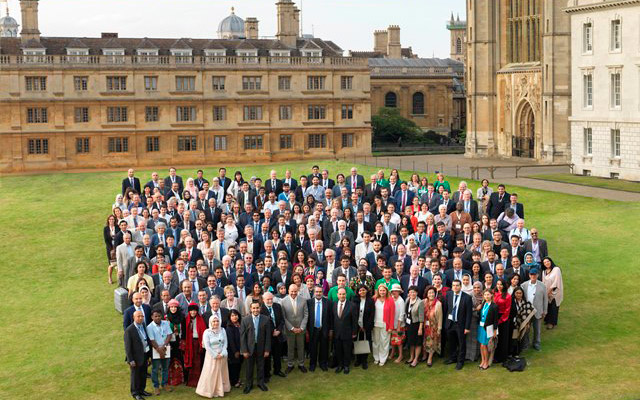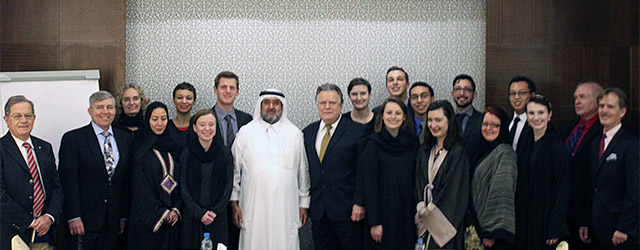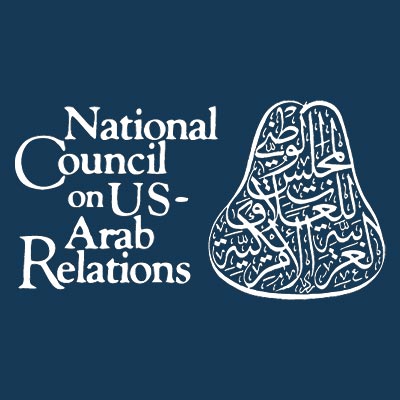The National Council is pleased to share remarks from specialists who participated in the Seventh Annual Gulf Research Meeting in Cambridge, United Kingdom.
For the many who are unaware of the Annual Gulf Research Meetings (GRM) in Cambridge, it is a gold mine of information, insight, knowledge, and understanding regarding the Gulf. Among the many yearly international conferences that focus on Arabia and the Gulf, arguably at once the world’s most strategically vital yet least understood region, few if any come close to this one.
Certainly, no comparably focused international forum is known to match the timeliness and context, or the nature, background, and preparation, that go into the planning and administration of the GRM’s annual three-day event, which is held in one of the loveliest, liveliest, and most intellectually stimulating settings imaginable.

In this regard, the Seventh Annual GRM was no different. Included were eleven separate and simultaneous workshops. And, as in each of the previous years, 300 participants, among whom again were fewer than 20 Americans, actively engaged in the give and take of the discussion periods and the question and answer sessions integral to the proceedings.
Each of the presentations at the annual GRMs occurs only after nearly an entire year’s preparation.The brainchild of the GRM is Dr. Abdulaziz Sager, founder of the Gulf Research Center (GRC), with offices in Jeddah, Geneva, and Cambridge (About whom, see more below).
The National Council is proud to be a partner with the GRC as a result of a Memorandum of Understanding entered into in 2015.
The GRM has quickly established itself as an extraordinary example of what can transpire if the visionaries are extraordinary, the topics exceptionally timely and relevant, and the workshops carefully organized to exhibit the best of existing scholarship on the region from scholars from throughout the world, especially younger scholars, analysts, and academics among tomorrow’s emerging leaders. In all, more than two thousand scholars have participated in the seven GRMs to date. Some forty books produced and distributed by some of the world’s most prominent publishers have been but one among others of the remarkable results of the yearly proceedings.

In order to place the GRC and the GRM in context, three short, incisive pieces follow. The first is extracted from the Council Chronicle, the periodic newsletter of the National Council on U.S.-Arab Relations. The second is the GRM’s introductory address by Stuart Laing, former Ambassador of the United Kingdom to Kuwait and Oman, Cambridge University Deputy Vice Chancellor, and Master of Corpus Christi College. The third, which will follow separately, is the keynote address at the opening session of the Seventh Annual Gulf Research Meeting by H.E. Dr. Abdul Latif bin Rashid Al Zayani, Secretary General of the Gulf Cooperation Council.
Dr. John Duke Anthony
Founding President and CEO
National Council on U.S.-Arab Relations
Washington, DC
Excerpt from Council Chronicle Volume 9, Number 2:
Dr. Abdulaziz Sager is the founding and chief facilitator of the Annual Gulf Research Meeting (GRM). Administered in Great Britain at Cambridge University annually during July and/or August, these three-day events have rapidly become the foremost of their kind. Beginning with an assemblage of more than 100 scholars, authors, and doctoral candidates specializing in one or more facets of the contemporary realities characterizing Arabia and the Gulf, these one-of-a-kind gatherings have grown to accommodate more than 300 participants. They are organized into roughly ten simultaneous mini-seminars with no more than 20 to 30 participants per seminar.
In each seminar, as many as half a dozen papers are presented. Led by Dr. Sager, together with Drs. Christian Koch, Mustafa Alani, and others, GRM papers have been published by I.B. Tauris, Palgrave Macmillan, Routledge, and Gerlach. National Council President and CEO Dr. John Duke Anthony, the sole American to have participated in all of the GRMs since their founding in 2009, commented, “No remotely comparable annual scholarly conference comes close to gathering and concentrating anywhere near as numerous a body of serious scholars on this globally vital region.”

Impressive as this achievement has been and continues to be, it is lamentable that so few American scholars and prospective specialists have participated in these annual endeavors at Cambridge, one of the world’s foremost institutions of higher education and second only to the University of Chicago in the number of Nobel Prize laureates. Indeed, beginning from the minuscule number of two American participants in the first GRM, representing one-fiftieth of the participants, the highest number of American participants to date has been just shy of 20, or one-fifteenth, the total.
Queried as to why this is the case, Dr. Anthony replied, “The following is opinion, not documented fact. From 1987 through 2008, scholars and specialists on Arabia and the Gulf within the GCC countries researched, located, and reached out to EU university professors and research institute specialists who shared their interests. This had no counterpart between the GCC and the United States, for reasons owing to the latter’s comparable lack of interest. The result was a dramatically asymmetrical pairing of GCC and EU scholars on Arabia and the Gulf. The educational, knowledge, understanding, and policymaking consequences of this are hardly unknown. They can be seen in the post-September 11, 2001 American reaction to Arabs and Muslims, a reaction that, since then, has intensified. It was seen also in the invasion and occupation of Iraq as well as in pan-GCC shock at perceived official U.S. lack of empathy as exhibited in Washington officialdom’s unwillingness to allay GCC countries’ dismay at unchecked Iranian meddling in GCC country and other Arab affairs.”
The introductory remarks of Stuart Laing, former British Ambassador to Kuwait and Oman, were superb, his best ever. One can readily see that he put much effort into the result. I have tried to edit out the intro flowery and obligatory references to Cambridge University’s hierarchy.
-John Duke Anthony
“The Gulf Counties Are Not Without Problems: Which of us is?”
An Introduction to the Seventh Annual Gulf Research Meeting at Cambridge University, Cambridge, United Kingdom
By Ambassador Stuart Laing
Deputy Vice Chancellor, Cambridge University and Trustee, Gulf Research Centre–Cambridge
August 16, 2016
In my capacity as a Deputy Vice-Chancellor of the University, I welcome everyone to the 7th Gulf Research Meeting (GRM). Cambridge is delighted and honoured to be the venue of this event, now a regular and important fixture in the academic calendar.
It is also an honour to speak as a Trustee of the Gulf Research Centre–Cambridge, the charitable company, which is behind the Gulf Research Meeting.
Our welcome extends to the scholars, policy officials and specialists participating in this year’s GRM workshops and also to the keynote speakers and to the several special guests. It would be impolitic to single out the numerous prominent attendees but for one exception. We are delighted to have with us again HE Major General Dr. Abdul Latif Bin Rashid Al-Zayani, Secretary General of the Gulf Cooperation Council.

In previous years I have said while addressing the GRM opening session that those of us who follow Middle Eastern affairs have sadly become accustomed to an almost perpetual atmosphere of crisis. I have also remarked that, in this part of the world, crisis can too easily turn into confrontation, confrontation into conflict, and conflict into catastrophe.
This is what we have witnessed over the last few years, on an unprecedented scale. Think, if you can bear to, of the numbers of casualties in Arab countries, killed and wounded, the numbers of displaced persons and refugees. Each and every one of those numbers represents a personal and family tragedy. We are shocked and moved at what is happening.
On top of the disastrous conflicts in Iraq, Syria, Libya and Yemen, and other areas of tension with their own, if less significant, losses of life, we now have economic and social problems in the region, which cry out for urgent solutions. Many of you will have read last week’s issue of The Economist, with its sad commentary on the economic and political management of Egypt, a pivotal country in the Arab world, which so many of us know and love.
Of course, the Gulf is not the stage on which these terrible dramas are being played out. But the Levant and North Africa have their connections with the Gulf, and Gulf governments and business people have a range of interests all across the Arab world. The programme for this year’s Meeting recognises this – for example in your workshops on Yemen and the GCC, and on GCC Foreign policy.
[pullquote]The countries of the Gulf are not without problems – which of us is? But they are currently peaceable and stable. And so they are well-placed to play constructive roles in assisting sister-communities in the Arab world to identify the paths to peace, and then to reconstruction; or to reform and to returned prosperity.[/pullquote]Your organisers have given the latter workshop the title of “Foreign Relations of the GCC Countries amid Shifting Global and Regional Dynamics”: “shifting dynamics” – I should say so! In the area of economic and social policy, your Conference organisers also recognise the connectivity in the workshops on the economics of migration, and labour market reform.
This is why a Conference such as the Gulf Research Meeting is so important. It recognises, implicitly, that through improved understanding of the economics, politics and social affairs of the Middle East in general, and the Gulf in particular, we may improve the chances of finding ways out of the sad circumstances in which several Arab societies and communities find themselves today. Informed analysis of problems is usually the preliminary to identifying solutions, even if we recognise that those solutions will in several cases take years to implement.
But I shall go wider than that. And I shall also look at the positive. The countries of the Gulf are not without problems – which of us is? But they are currently peaceable and stable. And so they are well-placed to play constructive roles in assisting sister-communities in the Arab world to identify the paths to peace, and then to reconstruction; or to reform and to returned prosperity.
And for us outside the region? Well, many of us living in Europe or North America, individuals, businesses and governments, we have historical, personal, commercial, and political connections across the Arab world. Both from affection and interest we wish to see Arab societies living peaceably with one another and ourselves, so that we can deal easily across borders and live in mutual prosperity.
So it is that we from outside the region, as well as those who live within it, benefit from expanding and deepening our knowledge and understanding of issues affecting Gulf countries and their neighbours.
Press, radio and television report incessantly on Middle East regional events – and their eyes go to experts to provide coherent analysis of problems and possible solutions. And why? Partly because events do not allow us to stand still. But also because issues and problems in the Middle East affect us all.
[pullquote]Events do not allow us to stand still. Issues and problems in the Middle East affect us all.[/pullquote]So your studies of the Gulf region carry global importance. Your agenda covers not only the problems, but also the strengths of Gulf economies and societies, and the potential of their human and other resources. You are standing in the present, but looking to the future. Outcomes from this Meeting bring value to many. In the summer sunshine of Cambridge, I ask only that you be not tempted to lounge on punts on the River Cam, lovely as that may be, but that you dutifully focus your energies in your seminar rooms!
Before closing, I should like to give a few words of thanks and congratulations. First, to those who have sponsored this and previous – and we hope future – GRMs. They are listed on the web site. Thanks go to those who are taking the lead at your eleven workshops. But also to the staff of the GRC, mostly in the GRC offices in Geneva and Jeddah, and those who support them here in Cambridge, for they work tirelessly to ensure a perfectly run conference.

Congratulations are due those who have contributed to the now very impressive list of publications, books, articles, papers and e-books, which have been created out of the GRM and the GRC. Most especially we thank Dr Abdul Aziz al-Sager, Chairman of the Gulf Research Centre, who has been the driving force of the GRM, and its generous supporter in so many ways.
During his career in the British Foreign Service, Stuart Laing served as Deputy Ambassador in Prague and Riyadh, and was appointed High Commissioner to Brunei (1998-2002), Ambassador to Oman (2002-05), and Ambassador to Kuwait (2005-08). In 2012, Mr. Laing published, with Mr. Robert Alston, Unshook till the end of time, a book on the history of Britain’s relationship with Oman. He currently serves as Cambridge University Deputy Vice Chancellor and Master of Corpus Christi College.
Further Reading:
- Dr. Imad Harb – “U.S.-GCC Relations and the Fight Against ISIS” (August 11, 2016)
- Dr. Paul Sullivan – “Can Saudi Arabia’s “Vision 2030″ Get the Kingdom Off the Oil-Economy Roller Coaster?” (June 20, 2016)
- Dr. John Duke Anthony – “America, Arabia, and the Gulf: At a Crossroads?” (May 31, 2016)
- Dr. John Duke Anthony – “Arabia to Asia: The Myths of an American ‘Pivot’ and Whether or Not There’s a U.S. Strategy Toward the GCC Region” (April 22, 2016)
- Christopher H. Johnson – “Economic Reform in Saudi Arabia: Opportunities for the Kingdom & America” (April 21, 2016)
- Dr. Paul Sullivan – “An Existential Political Economy of Post-Conflict Syria, Yemen, and Libya” (February 16, 2016)

